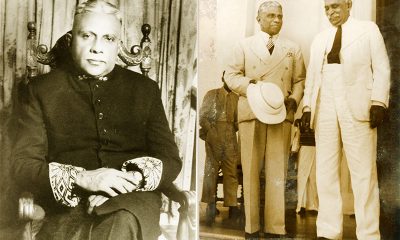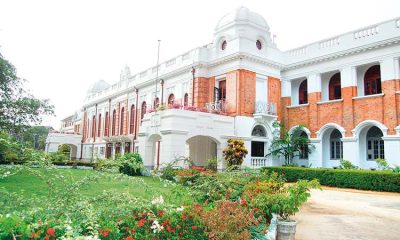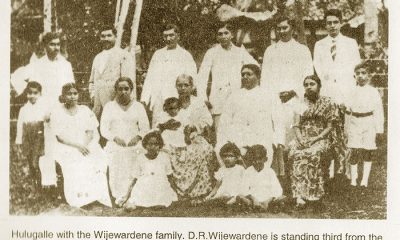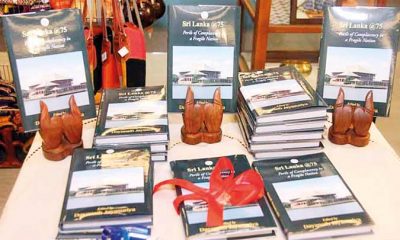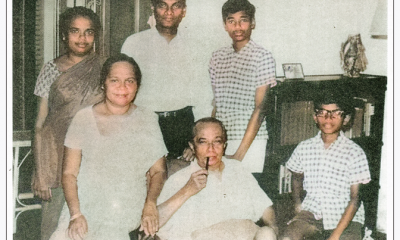Features
Drafting an amendment to the Order in Council and hosting a Commonwealth Conference

Excerpted from Memoirs of a Cabinet Secretary by BP Peiris
During the latter half of 1948, while holding the post of Assistant Secretary to the Cabinet, I was appointed as Secretary to the Commission on the Amendment of the Ceylon Constitution Order in Council. The members of the Commission were the Hon. L. A. Rajapakse, H. V. Perera, K. C., Sir Ivor Jennings, E. A. P. Wijeratne, G. G. Ponnambalam and J. A. Maartensz.
With so many legal brains on the Commission, I found the discussions most interesting. It was my first experience in a secretarial capacity to a Commission. My duty, as Secretary, was first to find a place at which to hold our meetings. The President of the Senate was kind enough to place one of the Senate Committee Rooms at our disposal, and meetings were held in the evenings because the busy legal practitioners on the Commission found it difficult to attend meetings during the court hours.
We were asked to report on the provisions of the Order in Council relating to the disqualification of persons for sitting or voting in Parliament. Two sections raised many difficulties, namely, the section disqualifying a person for holding a contract with the Crown and the section disqualifying persons who were serving or had served terms of imprisonment. A third difficulty arose by reason of the definition of ‘British subject’, which disqualified a person for sitting in Parliament if he was not a British subject.
‘British subject’ was defined in our Constitution to mean ‘a person who is a British subject according to the law for the time being of the United Kingdom, any person who has been naturalized under any enactment of any of His Majesty’s dominions and any person who is a citizen or subject of any of the Indian States as defined for the purposes of the Government of India Act, 1935″. Then came the British Nationality Act 1948, of the Parliament of the United Kingdom which created the status known as ‘Commonwealth citizen’, and gave it the same meaning as ‘British subject’.
This complicated matters a bit as D.S. Senanayake was anxious to keep the Indian labourers on estates out of the franchise and out of membership of the House of Representatives. Sir Ivor agreed to write the Report on these three matters. I agreed to write the rest and asked him to send me his draft as I had to fit my language to suit his. The report, as finally drafted by Sir Ivor and myself, was agreed to by all the Commissioners; there was no dissent. It was published as Sessional paper No. I of 1949.
I was next directed by D.S. Senanayake to be Assistant Secretary to the Commonwealth Foreign Ministers’ meeting to be held in Colombo. This was the first time such an important conference was being held in Ceylon and we had no experience of how to run the secretariat. The Secretaries to the Conference were Sir Norman Brook, Secretary to the U. K. Cabinet, and Mr (later Sir) Kanthiah Vaithianathan, Permanent Secretary to the Ministry of Defence and External Affairs. The Assistants were, from Ceylon: B. Mahadeva, R. Coomaraswamy and I, and from the U. K., Lloyd of the Foreign office, Bavin and Sykes of the Cabinet Office and Davey of the Commonwealth Relations Office. The Chief Clerk was Pink of the U.K. Cabinet Office.
Pink arrived in Ceylon on an advance visit two months before the Conference was due to begin. The UK Government was obviously not going to take any risks by entrusting the running of the Conference to an inexperienced Ceylon secretariat. Pink introduced himself to me and said he had been sent to see to all the preliminary arrangements. The heavy equipment like steel filing cabinets, roneo machines, typewriters, dispatch cases etc. would all be brought from England.
Nine girls from the U. K. Cabinet office would be coming to run the office. We were asked to supply the paper, pencils, clips, pins and other little things normally used at a conference. Pink gave me a complete list of his requirements and wanted to see the Conference Room which was the Cabinet Room. He was satisfied. Apart from the delegations, there was room only for three officials from each delegation. He wanted to see where Sir Norman would work, where the Assistants would work, and where he and the girls would work, all with one eye on absolute security, The President of the Senate had placed the entire Senate Building, except the Chamber, at the disposal of the staff. Pink was thoroughly satisfied with the arrangements.
Before he left, I took him out to show him a bit of the country. He had been so busy during his short stay that he had no time to get out of Colombo. We drove to the Hanwella rest house along the Low Level Road and there had a couple of glasses of arrack which I carried in a flask. Pink took about three millimeters topped up with ginger beer, and said it was far too strong.
On the return, we took the High Level Road to my home for lunch. I had asked my wife to prepare a lunch of rice and ‘soft’ curries, without too much pepper and chilly. Pink enjoyed the lunch and the drive and remembered the arrack when he came a second time for the Conference.
It was my duty to get the Conference Room ready. I had the floors and tables highly polished. Staffs for the flags of the different nations represented at the Conference had to be specially made and erected. In view of the rather unusual frontage of the Senate building, these staffs had to be of different lengths as all the flags had to fly at the same height. This work was carried out by the Public Works Department. The table was ready the day previous to the Conference, with a tin of cigarettes for each delegation, a decanter of water, matches etc. The room looked like a mirror. I locked the door and took the key in my charge.
Officers of the Criminal Investigation Department then walked in and asked me for permission to inspect the room from the point of view of security. I said I had already had a look, locked the room and taken the key. They said it was their responsibility and not mine, and demanded the key, which I was forced to give. They were armed with stepladders, electric torches and I don’t know what else. I reminded them that the floor had been highly polished and begged of them not to spoil it by dragging their ladders along.
They were very careful with the floor. But they pulled every book out of the bookcases, they pulled the cushions out of the chairs, they climbed the ladders to examine the electric lights and the fans, they even went to inspect the lavatories in their fruitless search for hidden bombs. Having completed the search, the senior officer asked me to lock the room again and hand him the key. This, I refused to do, as I was responsible for the key.
He therefore posted an armed guard with a bayonet in front of the door with instructions that no one, not even myself, was to be allowed to enter the room until he came the next morning and dismissed the guard. I informed the officer that I had work to do inside the room the next morning and told him that the guard should be dismissed at 8 a.m.
On the next morning, the guard was still on duty when I arrived and had not been dismissed; nor was the officer present. I was prevented from opening the door. I asked him to go and call his officer, and he said he could not leave his post. I asked him what his orders were, and he said “Shoot if anyone tries to get in.” I was angry; but orders were orders, and the poor devil was only doing his duty. I also had a job to do. I told him that I would give him and his officer another half an hour, that I would then open the door, and that he could carry out his order.
Just as I went up the second time to open the door, the Inspector came panting and apologized to me. Strong words passed, and I had to tell him that if the guard did not dismiss himself automatically at 8 a.m. in future, I would have to go to the Prime Minister for his order. There was no further trouble.
The hours of duty during the ten days of the Conference were from about 7. 30 a.m. to about 3 a.m. the next morning. The staff of the Secretariat, including the nine girls (three of whom were extremely pretty) arrived by special plane and were housed at the Grand Oriental Hotel. The hours of work were such that they had no time to go to the hotel for meals and it was arranged that all meals should be served in the Senate Refreshment Room on Government hospitality.
One day, when I was sipping an arrack in the Refreshment Room (I had two bottles of double-distilled of my own), Sir Norman came in for a drink and inquired what I was having. I was having mine in a sherry glass. When I told him what my drink was, he said he had heard a lot about Ceylon arrack and expressed a desire to taste some. I called for my bottle but warned him that the drink was strong and advised him to dilute it. I was sipping mine neat and he said he would have it the same way and in the same sort of glass. He had several, after which I gave an order that whenever Sir Norman came for a meal, my bottle was to be placed on his table.
Sir Norman instructed each of his Assistants as regards his duties. We were each, in turn, to take a half hour of duty and present to him a draft, which he would consolidate and revise before circulation to the delegates. He worked hard at it till about 11 p.m. which was our normal dinner hour, his hair pulled down over his forehead and his bottle of gin on his table.
Vaithianathan was on the ceremonial side and had nothing to do with the minutes. Brook’s final draft was sent to the typing room to be attended to by the girls, who were in the charge of a lady supervisor from the U. K. Civil Service. Practice required that the minutes of a meeting should be on the breakfast plates of delegates the following morning. They were delivered to a responsible officer of the delegation under armed police guard.
Everything went well till about the third day. I was going down to dinner at about 11 p.m. when I found Pink coming out of his room for the same purpose. We walked along the corridor together. On the way, he said he was understaffed, that his girls were overworked, that in view of the secret nature of the work, typists from outside could not be employed, and inquired whether I had three typists in my office whose services I could spare. I had only three, and I released them all immediately for work in the typing room.
Now, for the actual Conference. As I said, elaborate security measures had been taken for the safety of the delegates and no person was admitted into the Senate building except on presentation of an identity card. Members of delegations were requested to make it a point to carry their cards and not to misunderstand the instruction. The police had been instructed to enforce the rule strictly.
Papers were circulated twice a day, at 8 a.m. and 10 p.m. in locked boxes, the keys of which were handed to the delegations as they arrived. Steel cabinets and iron safes were provided in the office of each delegation. S. K. D. Jayamane was in charge of Protocol. The Delegations were as follows:
Ceylon:
Rt Hon. D.S. Senanayake, Senator L. A. Rajapakse, Mr J. R. Jayewardene and Mr R. G. Senanayake.
United Kingdom
Rt Hon. Ernest Bevin, M. P., Rt Hon. P. J. Noel Baker, M. P., Rt Hon. Malcolm Macdonald and Sir Walter Hankinson
Canada
Mr Lester Pearson
Australia
Mr P. C. Spender, K. C., Mr H. R. Gollan, Mr J. E. Oldham and Mr C. W. Frost
New Zealand
Mr F. W. Doidge
South Afric
a Mr Paul Sauer and Mr D. D. Forsyth
India
Pandit Nehru, Mr V. K. Krishna Menon and Mr V. V. Giri
Pakistan
Mr Ghulam Mohamed, Mr H. I. Rahimtoola and Mr M. Ikramulla
Delegates arrived at the Cabinet office in cars displaying their National flags. Nehru, who arrived in the Governor-General’s car, preferred to return on foot amidst cheers from the crowd who were kept by the Police to the other side of the pavement. Ernest Bevin was a guest of the Prime Minister at ‘Temple Trees’. Other delegates were housed at different hotels.
One day, after my half hour of duty, I came out of the room to smoke but found I had no matches. Immediately, a gentleman seated in the lobby rose and said, “I can notice a man in distress, Sir, I am from Scotland Yard.” He was Bevin’s bodyguard. Nehru was a heavy smoker. He always left a meeting whistling one of Strauss’ Viennese waltzes.
Features
The heart-friendly health minister

by Dr Gotabhya Ranasinghe
Senior Consultant Cardiologist
National Hospital Sri Lanka
When we sought a meeting with Hon Dr. Ramesh Pathirana, Minister of Health, he graciously cleared his busy schedule to accommodate us. Renowned for his attentive listening and deep understanding, Minister Pathirana is dedicated to advancing the health sector. His openness and transparency exemplify the qualities of an exemplary politician and minister.
Dr. Palitha Mahipala, the current Health Secretary, demonstrates both commendable enthusiasm and unwavering support. This combination of attributes makes him a highly compatible colleague for the esteemed Minister of Health.
Our discussion centered on a project that has been in the works for the past 30 years, one that no other minister had managed to advance.
Minister Pathirana, however, recognized the project’s significance and its potential to revolutionize care for heart patients.
The project involves the construction of a state-of-the-art facility at the premises of the National Hospital Colombo. The project’s location within the premises of the National Hospital underscores its importance and relevance to the healthcare infrastructure of the nation.
This facility will include a cardiology building and a tertiary care center, equipped with the latest technology to handle and treat all types of heart-related conditions and surgeries.
Securing funding was a major milestone for this initiative. Minister Pathirana successfully obtained approval for a $40 billion loan from the Asian Development Bank. With the funding in place, the foundation stone is scheduled to be laid in September this year, and construction will begin in January 2025.
This project guarantees a consistent and uninterrupted supply of stents and related medications for heart patients. As a result, patients will have timely access to essential medical supplies during their treatment and recovery. By securing these critical resources, the project aims to enhance patient outcomes, minimize treatment delays, and maintain the highest standards of cardiac care.
Upon its fruition, this monumental building will serve as a beacon of hope and healing, symbolizing the unwavering dedication to improving patient outcomes and fostering a healthier society.We anticipate a future marked by significant progress and positive outcomes in Sri Lanka’s cardiovascular treatment landscape within the foreseeable timeframe.
Features
A LOVING TRIBUTE TO JESUIT FR. ALOYSIUS PIERIS ON HIS 90th BIRTHDAY

by Fr. Emmanuel Fernando, OMI
Jesuit Fr. Aloysius Pieris (affectionately called Fr. Aloy) celebrated his 90th birthday on April 9, 2024 and I, as the editor of our Oblate Journal, THE MISSIONARY OBLATE had gone to press by that time. Immediately I decided to publish an article, appreciating the untiring selfless services he continues to offer for inter-Faith dialogue, the renewal of the Catholic Church, his concern for the poor and the suffering Sri Lankan masses and to me, the present writer.
It was in 1988, when I was appointed Director of the Oblate Scholastics at Ampitiya by the then Oblate Provincial Fr. Anselm Silva, that I came to know Fr. Aloy more closely. Knowing well his expertise in matters spiritual, theological, Indological and pastoral, and with the collaborative spirit of my companion-formators, our Oblate Scholastics were sent to Tulana, the Research and Encounter Centre, Kelaniya, of which he is the Founder-Director, for ‘exposure-programmes’ on matters spiritual, biblical, theological and pastoral. Some of these dimensions according to my view and that of my companion-formators, were not available at the National Seminary, Ampitiya.
Ever since that time, our Oblate formators/ accompaniers at the Oblate Scholasticate, Ampitiya , have continued to send our Oblate Scholastics to Tulana Centre for deepening their insights and convictions regarding matters needed to serve the people in today’s context. Fr. Aloy also had tried very enthusiastically with the Oblate team headed by Frs. Oswald Firth and Clement Waidyasekara to begin a Theologate, directed by the Religious Congregations in Sri Lanka, for the contextual formation/ accompaniment of their members. It should very well be a desired goal of the Leaders / Provincials of the Religious Congregations.
Besides being a formator/accompanier at the Oblate Scholasticate, I was entrusted also with the task of editing and publishing our Oblate journal, ‘The Missionary Oblate’. To maintain the quality of the journal I continue to depend on Fr. Aloy for his thought-provoking and stimulating articles on Biblical Spirituality, Biblical Theology and Ecclesiology. I am very grateful to him for his generous assistance. Of late, his writings on renewal of the Church, initiated by Pope St. John XX111 and continued by Pope Francis through the Synodal path, published in our Oblate journal, enable our readers to focus their attention also on the needed renewal in the Catholic Church in Sri Lanka. Fr. Aloy appreciated very much the Synodal path adopted by the Jesuit Pope Francis for the renewal of the Church, rooted very much on prayerful discernment. In my Religious and presbyteral life, Fr.Aloy continues to be my spiritual animator / guide and ongoing formator / acccompanier.
Fr. Aloysius Pieris, BA Hons (Lond), LPh (SHC, India), STL (PFT, Naples), PhD (SLU/VC), ThD (Tilburg), D.Ltt (KU), has been one of the eminent Asian theologians well recognized internationally and one who has lectured and held visiting chairs in many universities both in the West and in the East. Many members of Religious Congregations from Asian countries have benefited from his lectures and guidance in the East Asian Pastoral Institute (EAPI) in Manila, Philippines. He had been a Theologian consulted by the Federation of Asian Bishops’ Conferences for many years. During his professorship at the Gregorian University in Rome, he was called to be a member of a special group of advisers on other religions consulted by Pope Paul VI.
Fr. Aloy is the author of more than 30 books and well over 500 Research Papers. Some of his books and articles have been translated and published in several countries. Among those books, one can find the following: 1) The Genesis of an Asian Theology of Liberation (An Autobiographical Excursus on the Art of Theologising in Asia, 2) An Asian Theology of Liberation, 3) Providential Timeliness of Vatican 11 (a long-overdue halt to a scandalous millennium, 4) Give Vatican 11 a chance, 5) Leadership in the Church, 6) Relishing our faith in working for justice (Themes for study and discussion), 7) A Message meant mainly, not exclusively for Jesuits (Background information necessary for helping Francis renew the Church), 8) Lent in Lanka (Reflections and Resolutions, 9) Love meets wisdom (A Christian Experience of Buddhism, 10) Fire and Water 11) God’s Reign for God’s poor, 12) Our Unhiddden Agenda (How we Jesuits work, pray and form our men). He is also the Editor of two journals, Vagdevi, Journal of Religious Reflection and Dialogue, New Series.
Fr. Aloy has a BA in Pali and Sanskrit from the University of London and a Ph.D in Buddhist Philosophy from the University of Sri Lankan, Vidyodaya Campus. On Nov. 23, 2019, he was awarded the prestigious honorary Doctorate of Literature (D.Litt) by the Chancellor of the University of Kelaniya, the Most Venerable Welamitiyawe Dharmakirthi Sri Kusala Dhamma Thera.
Fr. Aloy continues to be a promoter of Gospel values and virtues. Justice as a constitutive dimension of love and social concern for the downtrodden masses are very much noted in his life and work. He had very much appreciated the commitment of the late Fr. Joseph (Joe) Fernando, the National Director of the Social and Economic Centre (SEDEC) for the poor.
In Sri Lanka, a few religious Congregations – the Good Shepherd Sisters, the Christian Brothers, the Marist Brothers and the Oblates – have invited him to animate their members especially during their Provincial Congresses, Chapters and International Conferences. The mainline Christian Churches also have sought his advice and followed his seminars. I, for one, regret very much, that the Sri Lankan authorities of the Catholic Church –today’s Hierarchy—- have not sought Fr.
Aloy’s expertise for the renewal of the Catholic Church in Sri Lanka and thus have not benefited from the immense store of wisdom and insight that he can offer to our local Church while the Sri Lankan bishops who governed the Catholic church in the immediate aftermath of the Second Vatican Council (Edmund Fernando OMI, Anthony de Saram, Leo Nanayakkara OSB, Frank Marcus Fernando, Paul Perera,) visited him and consulted him on many matters. Among the Tamil Bishops, Bishop Rayappu Joseph was keeping close contact with him and Bishop J. Deogupillai hosted him and his team visiting him after the horrible Black July massacre of Tamils.
Features
A fairy tale, success or debacle

Sri Lanka-Singapore Free Trade Agreement
By Gomi Senadhira
senadhiragomi@gmail.com
“You might tell fairy tales, but the progress of a country cannot be achieved through such narratives. A country cannot be developed by making false promises. The country moved backward because of the electoral promises made by political parties throughout time. We have witnessed that the ultimate result of this is the country becoming bankrupt. Unfortunately, many segments of the population have not come to realize this yet.” – President Ranil Wickremesinghe, 2024 Budget speech
Any Sri Lankan would agree with the above words of President Wickremesinghe on the false promises our politicians and officials make and the fairy tales they narrate which bankrupted this country. So, to understand this, let’s look at one such fairy tale with lots of false promises; Ranil Wickremesinghe’s greatest achievement in the area of international trade and investment promotion during the Yahapalana period, Sri Lanka-Singapore Free Trade Agreement (SLSFTA).
It is appropriate and timely to do it now as Finance Minister Wickremesinghe has just presented to parliament a bill on the National Policy on Economic Transformation which includes the establishment of an Office for International Trade and the Sri Lanka Institute of Economics and International Trade.
Was SLSFTA a “Cleverly negotiated Free Trade Agreement” as stated by the (former) Minister of Development Strategies and International Trade Malik Samarawickrama during the Parliamentary Debate on the SLSFTA in July 2018, or a colossal blunder covered up with lies, false promises, and fairy tales? After SLSFTA was signed there were a number of fairy tales published on this agreement by the Ministry of Development Strategies and International, Institute of Policy Studies, and others.
However, for this article, I would like to limit my comments to the speech by Minister Samarawickrama during the Parliamentary Debate, and the two most important areas in the agreement which were covered up with lies, fairy tales, and false promises, namely: revenue loss for Sri Lanka and Investment from Singapore. On the other important area, “Waste products dumping” I do not want to comment here as I have written extensively on the issue.
1. The revenue loss
During the Parliamentary Debate in July 2018, Minister Samarawickrama stated “…. let me reiterate that this FTA with Singapore has been very cleverly negotiated by us…. The liberalisation programme under this FTA has been carefully designed to have the least impact on domestic industry and revenue collection. We have included all revenue sensitive items in the negative list of items which will not be subject to removal of tariff. Therefore, 97.8% revenue from Customs duty is protected. Our tariff liberalisation will take place over a period of 12-15 years! In fact, the revenue earned through tariffs on goods imported from Singapore last year was Rs. 35 billion.
The revenue loss for over the next 15 years due to the FTA is only Rs. 733 million– which when annualised, on average, is just Rs. 51 million. That is just 0.14% per year! So anyone who claims the Singapore FTA causes revenue loss to the Government cannot do basic arithmetic! Mr. Speaker, in conclusion, I call on my fellow members of this House – don’t mislead the public with baseless criticism that is not grounded in facts. Don’t look at petty politics and use these issues for your own political survival.”
I was surprised to read the minister’s speech because an article published in January 2018 in “The Straits Times“, based on information released by the Singaporean Negotiators stated, “…. With the FTA, tariff savings for Singapore exports are estimated to hit $10 million annually“.
As the annual tariff savings (that is the revenue loss for Sri Lanka) calculated by the Singaporean Negotiators, Singaporean $ 10 million (Sri Lankan rupees 1,200 million in 2018) was way above the rupees’ 733 million revenue loss for 15 years estimated by the Sri Lankan negotiators, it was clear to any observer that one of the parties to the agreement had not done the basic arithmetic!
Six years later, according to a report published by “The Morning” newspaper, speaking at the Committee on Public Finance (COPF) on 7th May 2024, Mr Samarawickrama’s chief trade negotiator K.J. Weerasinghehad had admitted “…. that forecasted revenue loss for the Government of Sri Lanka through the Singapore FTA is Rs. 450 million in 2023 and Rs. 1.3 billion in 2024.”
If these numbers are correct, as tariff liberalisation under the SLSFTA has just started, we will pass Rs 2 billion very soon. Then, the question is how Sri Lanka’s trade negotiators made such a colossal blunder. Didn’t they do their basic arithmetic? If they didn’t know how to do basic arithmetic they should have at least done their basic readings. For example, the headline of the article published in The Straits Times in January 2018 was “Singapore, Sri Lanka sign FTA, annual savings of $10m expected”.
Anyway, as Sri Lanka’s chief negotiator reiterated at the COPF meeting that “…. since 99% of the tariffs in Singapore have zero rates of duty, Sri Lanka has agreed on 80% tariff liberalisation over a period of 15 years while expecting Singapore investments to address the imbalance in trade,” let’s turn towards investment.
Investment from Singapore
In July 2018, speaking during the Parliamentary Debate on the FTA this is what Minister Malik Samarawickrama stated on investment from Singapore, “Already, thanks to this FTA, in just the past two-and-a-half months since the agreement came into effect we have received a proposal from Singapore for investment amounting to $ 14.8 billion in an oil refinery for export of petroleum products. In addition, we have proposals for a steel manufacturing plant for exports ($ 1 billion investment), flour milling plant ($ 50 million), sugar refinery ($ 200 million). This adds up to more than $ 16.05 billion in the pipeline on these projects alone.
And all of these projects will create thousands of more jobs for our people. In principle approval has already been granted by the BOI and the investors are awaiting the release of land the environmental approvals to commence the project.
I request the Opposition and those with vested interests to change their narrow-minded thinking and join us to develop our country. We must always look at what is best for the whole community, not just the few who may oppose. We owe it to our people to courageously take decisions that will change their lives for the better.”
According to the media report I quoted earlier, speaking at the Committee on Public Finance (COPF) Chief Negotiator Weerasinghe has admitted that Sri Lanka was not happy with overall Singapore investments that have come in the past few years in return for the trade liberalisation under the Singapore-Sri Lanka Free Trade Agreement. He has added that between 2021 and 2023 the total investment from Singapore had been around $162 million!
What happened to those projects worth $16 billion negotiated, thanks to the SLSFTA, in just the two-and-a-half months after the agreement came into effect and approved by the BOI? I do not know about the steel manufacturing plant for exports ($ 1 billion investment), flour milling plant ($ 50 million) and sugar refinery ($ 200 million).
However, story of the multibillion-dollar investment in the Petroleum Refinery unfolded in a manner that would qualify it as the best fairy tale with false promises presented by our politicians and the officials, prior to 2019 elections.
Though many Sri Lankans got to know, through the media which repeatedly highlighted a plethora of issues surrounding the project and the questionable credentials of the Singaporean investor, the construction work on the Mirrijiwela Oil Refinery along with the cement factory began on the24th of March 2019 with a bang and Minister Ranil Wickremesinghe and his ministers along with the foreign and local dignitaries laid the foundation stones.
That was few months before the 2019 Presidential elections. Inaugurating the construction work Prime Minister Ranil Wickremesinghe said the projects will create thousands of job opportunities in the area and surrounding districts.
The oil refinery, which was to be built over 200 acres of land, with the capacity to refine 200,000 barrels of crude oil per day, was to generate US$7 billion of exports and create 1,500 direct and 3,000 indirect jobs. The construction of the refinery was to be completed in 44 months. Four years later, in August 2023 the Cabinet of Ministers approved the proposal presented by President Ranil Wickremesinghe to cancel the agreement with the investors of the refinery as the project has not been implemented! Can they explain to the country how much money was wasted to produce that fairy tale?
It is obvious that the President, ministers, and officials had made huge blunders and had deliberately misled the public and the parliament on the revenue loss and potential investment from SLSFTA with fairy tales and false promises.
As the president himself said, a country cannot be developed by making false promises or with fairy tales and these false promises and fairy tales had bankrupted the country. “Unfortunately, many segments of the population have not come to realize this yet”.
(The writer, a specialist and an activist on trade and development issues . )


